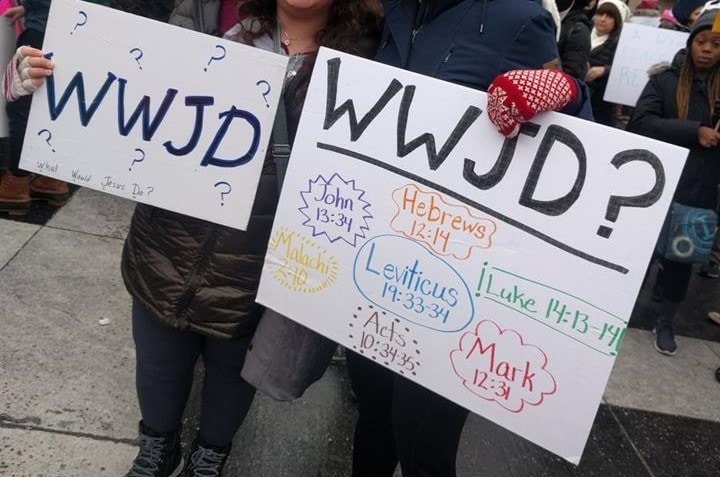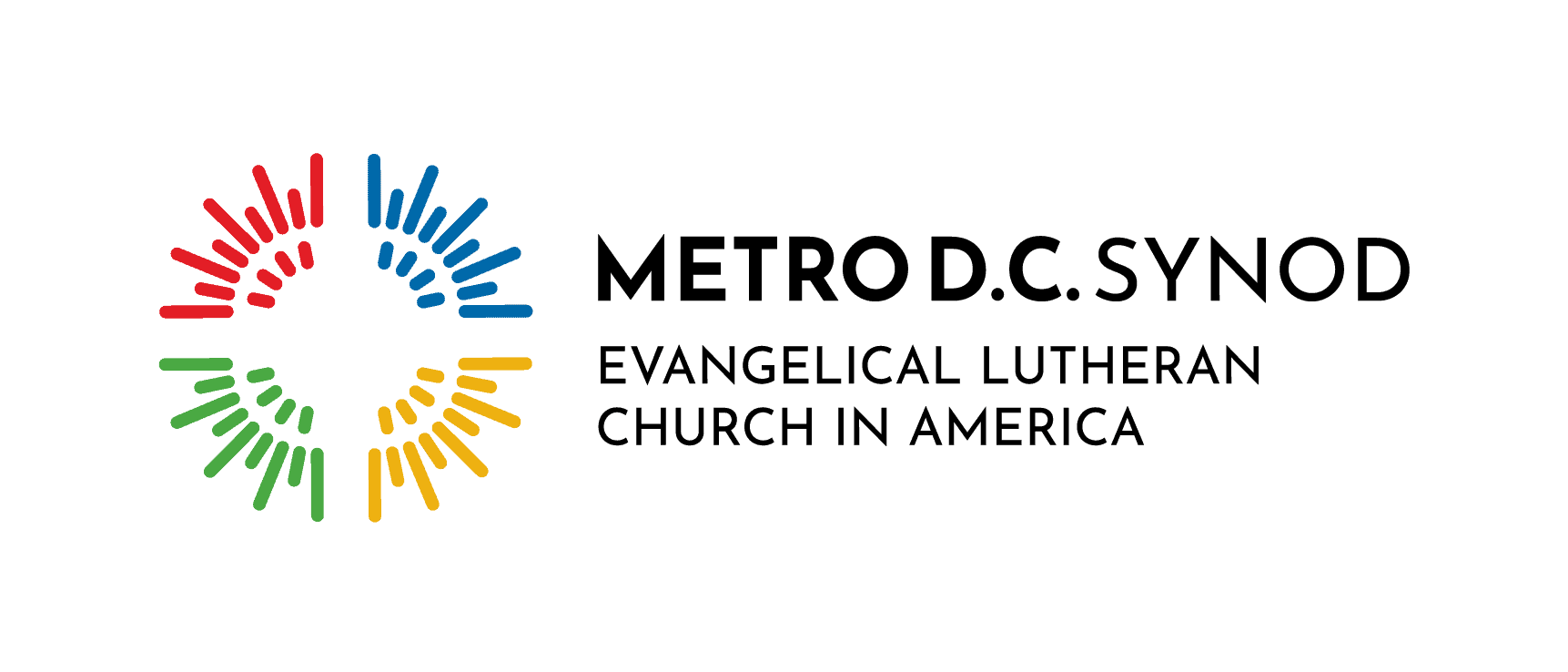What Would Jesus Do?

Laura Stall

January 19, 2019 was the third annual Women’s March in Washington, D.C. The Women’s March is a women-led movement whose goal is to “harness the political power of diverse women and their communities to create transformative social change” (Women’s March page). Each year, women gather in D.C. with signs to show their support for the cause. This year, I saw many great signs. The above sign stuck out to me because the holder did what every writer and editor like myself loves to see: they cited their sources.
WWJD. What Would Jesus Do? The slogan dates to 1886 to a series of sermons of Charles Sheldon, a minister from Topeka, Kansas. Every sermon, he would pose the question, “What would Jesus do?” The phrase then grew to popularity in the 1990s thanks to Janie Tinklenberg’s movement to appeal to the youth of her Christian community. In 2019, it showed up at the Women’s March in D.C. Amid the Government Shutdown, a demand for a wall to keep immigrants out of our country, white supremacists gathering in Charlottesville, it’s sometimes important to ask, “What would Jesus do?”
From top left:
John 13:34 – “I give you a new commandment, that you love one another. Just as I have loved you, you also should love one another.”
Hebrews 12:14 – “Pursue peace with everyone, and the holiness without which no one will see the Lord.”
Luke 14:13-14 – “But when you give a banquet, invite the poor, the crippled, the lame, and the blind. 1And you will be blessed, because they cannot repay you, for you will be repaid at the resurrection of the righteous.”
Malachi 2:10 –Have we not all one father? Has not one God created us? Why then are we faithless to one another, profaning the covenant of our ancestors?
Leviticus 19:33-34 – “When an alien resides with you in your land, you shall not oppress the alien.The alien who resides with you shall be to you as the citizen among you; you shall love the alien as yourself, for you were aliens in the land of Egypt: I am the Lord your God.”
Mark 12:31 – “The second is this, ‘You shall love your neighbor as yourself.’ There is no other commandment greater than these.”
Acts 10:34-35 – “Then Peter began to speak to them: “I truly understand that God shows no partiality /but in every nation anyone who fears him and does what is right is acceptable to him.”
New Revised Standard Version, Source: Bible Gateway
First of all, I recognize that some of these are not from the New Testament, but I wanted to include all the quotes anyway.
It is important to note that, with the separation of church and state, one should not expect any type of holy scripture to influence political leaders in their decisions for the country. However, in this world, we see many people—political leaders and citizens alike—who believe they are living by scripture, even if their actions prove otherwise.
Mary, Joseph, Jesus, and all his followers were Middle Eastern. They were brown. The pictures we see of a white Jesus with light hair are simply not accurate. He and his Apostles were born in places that would now be included in the travel ban (i.e., Peter was born in Syria). And they were Jewish. In Charlottesville, white men carried torches and marched on the University of Virginia campus, chanting both racist and antisemitic chants. Their white supremacist views reflect the long-standing views of the pure, white Christian being superior to all others. But Jesus, Simon Peter, Andrew, John…none of them would have perpetuated the standard, because they themselves didn’t even fit that standard.
And the idea of a “standard” brings us back to the question, “What Would Jesus Do?” To figure out what Jesus would do, it’s important to think about what Jesus actually did. Jason Chesnut addresses this in a Facebook post from January 22nd:
“WWJD [what would Jesus do] imagines a nice, pious hall monitor, making sure no one is uncomfortable, making no waves, propping up a violent status quo by keeping his mouth shut.
WDJD [what did Jesus do] has teeth, and doesn’t imagine anything –– but, instead, takes its cues from what Jesus actually did. Ya know, in the Bible.”
Jesus actively made authority angry. When he saw something wrong, he called it out, and not always peacefully. In Mark 11:12-25, Jesus and his disciples went to Jerusalem. Jesus, angry upon seeing a marketplace of cattle, sheep, and doves, he turned over all the tables and drove everyone from the Temple. “Is it not written: ‘My house will be called a house of prayer for all nations?’ But you have made it a den of robbers.”
Jesus healed the sick without expecting anything in return. In Mark: 25-34, a woman who had been suffering from bleeding and was excluded from society pushed her way through the crowd to touch the fabric of Jesus’ clothing. She was breaking all sorts of societal rules, but Jesus did not chastise her. He searched for her, he called out to her, and said “by faith, you are healed.” He touched the sick, praised the poor (The Widow’s Offering, Mark 12:41-44), and made it his mission in life to improve theirs.
Long story short: I can appreciate what these ladies have on their posters. But in addition to what we find in Scripture, we must remember that, at the end of the day, whatever Jesus did, he did with dirty fingernails. He wasn’t making himself the most presentable he could be when he spoke to people. He did not stand at a clean podium and speak softly, hoping that people would listen. He travelled and walked amongst those who society disdained, spreading his word and starting his movement. He made sure that people heard him.
So, what would Jesus do? In today’s current political climate, he would make us uncomfortable. He would point out the inequalities and the injustices that minorities face daily. He would be on the opposite side of any wall, risking arrest by leaving water and food to those seeking asylum and a better life. His interests would not be on an unproven immigration crisis, but rather on the water crisis in Flint that’s been going on 2 years, recovery in Puerto Rico, and providing healthcare for all citizens. He would be amongst the people, teaching them and working with them. Because that’s exactly what he always did. And, much like his first time around, he would be vilified for it. Political leaders would feel threatened. But that wouldn’t stop him.
If we want to act in accordance with what Jesus would do, we must keep all of this in mind. We must welcome our brothers and sisters—especially the poor, displaced, and sick—and make it our mission to make their lives better. We must place ourselves on the side of the marginalized and recognize where we can use our positions and privileges (should we benefit from them) to help them in the face of all the adversity they encounter. I’m not advocating for destroying property, but sometimes systems and institutions need to be questioned and torn apart for change to happen. Jesus understood that. And we need to as well.
“How does God’s love abide in anyone who has the world’s goods and sees a brother or sister in need and yet refuses to help?
Little children, let us love, not in word or speech, but in truth and action” (1 John 3:17-18)
Take action. Do Good. Because that’s what Jesus would do.


